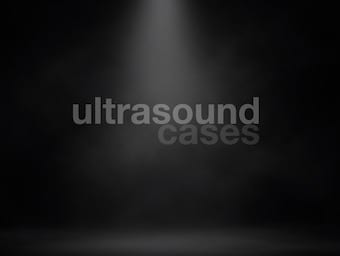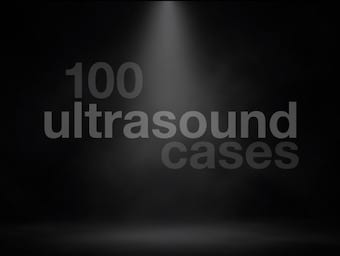
Ultrasound Case 112
A 30 year old woman who is currently 30 weeks gestation presents to the ED with abrupt, severe right loin pain.

A 30 year old woman who is currently 30 weeks gestation presents to the ED with abrupt, severe right loin pain.

A 45 year old woman with chronic alcoholic liver disease presents to the ED with exertional dyspnoea and is noted to have a SpO2 of 90% at rest despite having a normal chest examination and CXR.

A 40 yo man is admitted with lobar pneumonia. He develops new atrial fibrillation with rapid ventricular response; becomes hypotensive and increasingly dyspnoeic.

A 6 year old boy presents with lower abdominal pain and vomiting. He has had intermittent pain for a week thought to be due to mesenteric adenitis.

An 18 year old presents with progressive swelling and erythema of his distal phalanx. The question was asked - is this a simple paronychia?

A middle aged man presents with a painful, bruised swollen penis after feeling a sharp snap and pain during sexual intercourse. This resulted in immediate detumescence, swelling and pain.

A 24 year old man present with right loin pain. He has recently been on a keto diet (high in protein and fat, no carboydrates) and has had dramatic weight loss.

A 22 year old man presents anxious he has noted a swelling in his scrotum. It is bigger when he stands up, and feels like a bag of worms.

A 33 year old woman is hit in the left lower chest with a high speed hockey ball. She has moderate pain and some postural hypotension and tachycardia. FAST demonstrates a splenic laceration and rupture with free fluid, she has a CT and proceeds for embolisation.

A 38 year old woman presents with midcycle LIF pain. It is colicky and you are asked to scan her pelvis. Ultrasound Top 100 Cases

Presentation A 19 year old woman presents with LUQ pain post minor trauma. Your registrar comes to you with this clip concerned they have found a supcapsular splenic haematoma. What do you think? Describe and interpret these scans

A 74 year old man presents with increasing fluid overload and hypotension. He has small complexes on his ECG and you are asked to assess for a pericardial effusion. There is lots of fluid, can you describe where it is?